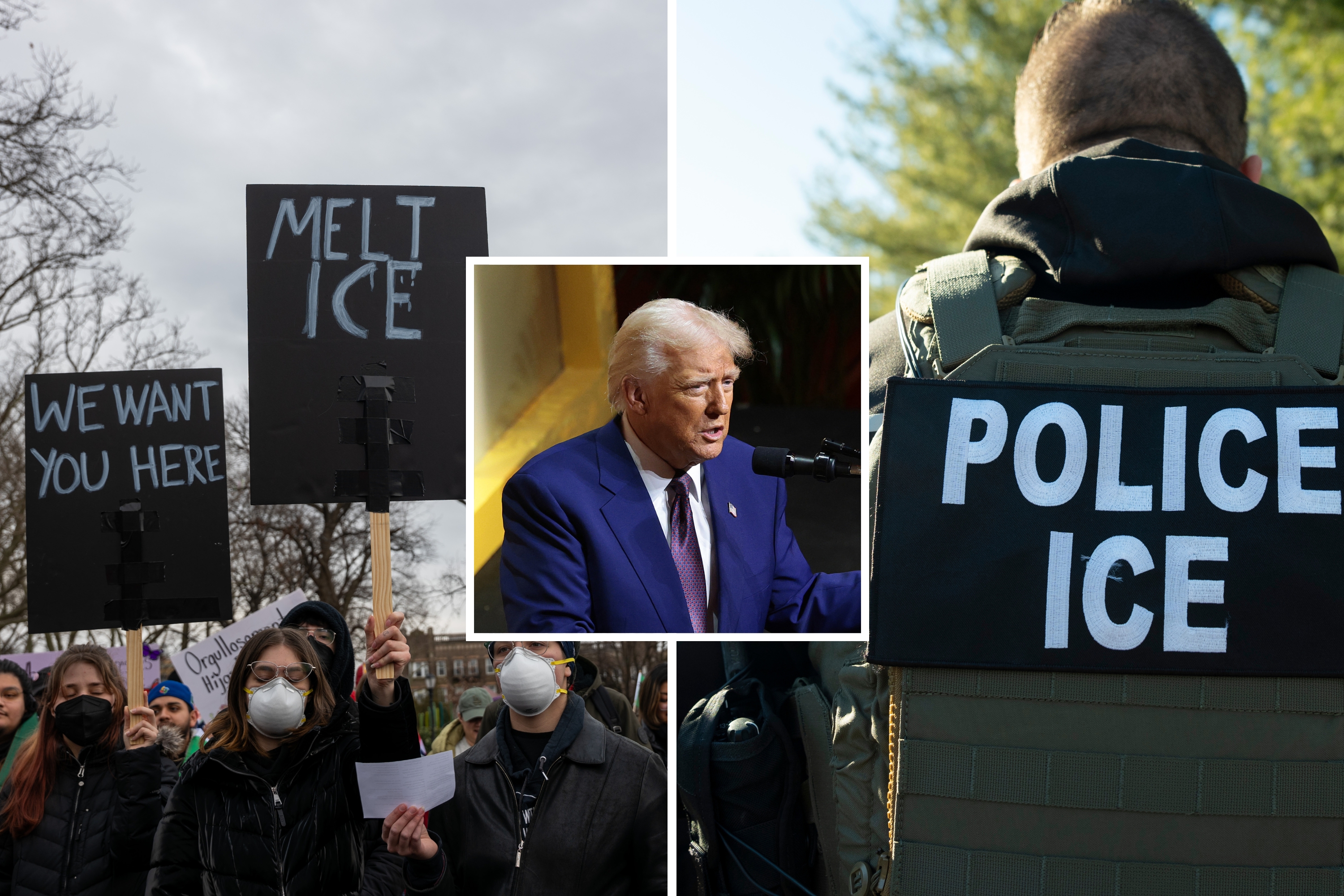The Trump administration said Thursday that its first month had seen “massive strides” in increasing border security and cutting illegal immigration, as the legal challenges to the president’s policies keep coming.
In a 15-point list, the Department of Homeland Security (DHS) laid out what it said were “promises made, promises kept”, including an increase in arrests of illegal immigrant criminals and the scrapping of former President Joe Biden’s policies.
Despite promises of mass deportations, the number of immigrants removed from the country since January 20 was not mentioned by either the press release or White House Deputy Chief of Staff Stephen Miller at a briefing.
“In thirty days, the President sealed the borders shut, declared the cartels to be terrorist organizations, has increased ICE deportations to levels not seen in decades, and we are shortly on the verge of achieving a speed and pace of deportations that this country has never before seen,” Miller told reporters when pressed on whether the president was happy with deportation numbers.
The Reuters news agency later reported that 37,660 migrants had been deported in Trump’s first month, putting the new administration behind Biden’s monthly average of 57,000.
Newsweek reached out to DHS for more information on the reported deportation numbers Thursday afternoon.
Why It Matters
Cracking down on illegal border crossings, Biden-era policies, and transnational criminal gangs were key elements of President Donald Trump’s 2024 election campaign, with his promise of mass deportations of over 11 million illegal immigrants seeing widespread support among voters polled before and after the election. Being seen to deliver on those promises will be crucial for the White House after setting such an ambitious target.
What To Know
The list from DHS included actions taken by the president and Secretary of Homeland Security Kristi Noem since January 20, including declaring a national emergency at the southern border, designating cartels and criminal groups as Foreign Terrorist Organizations, and signing the Laken Riley Act into law to increase detentions of illegal immigrants accused of or charged with a crime.
AP Photo/Getty Images
How Many Migrants Have Been Deported?
The Reuters report, citing DHS data not public at time of publication, said 37,600 people had been removed from the country in the month since January 20, averaging out to around 9,400 per week.
When pressed on whether the president was happy with the rate of deportations on Thursday, Miller did not give a number, but promised that the “full might” of the administration would be used to remove “all criminal illegals” from the U.S.
The only other figure on deportations since January 20 came in a video shared by DHS on February 4, in which it said 5,693 people were deported or removed to 121 countries in the first two weeks of the new administration.
If this number was the total removals from the U.S. in that time, it would put the Trump administration behind the rate seen under Biden, whose DHS removed an average of 12,000 a week in November 2024.
If the figure accounts solely for those arrested by ICE inside the interior U.S. and away from the border, then this administration would be outpacing its predecessors. The last monthly figure available from ICE is September 2024, when 4,080 of its arrestees were removed during that month.
A senior official told Reuters that Biden’s numbers were higher because of increased border crossings and deportations taking place there rather than the interior.

JUSTIN HAMEL/AFP via Getty Images
Since DHS publicized the 5,700 number, daily updates from ICE and DHS have dried up, and no new figures have been made available on government websites usually updated each month. One analyst who tracks removal flights told Newsweek that numbers did not appear to be drastically different from previous months.
Miller claimed that ICE had been effectively shuttered under Biden, but the agency’s annual report for Fiscal Year 2024 showed it had removed 271,484 people – the highest since 2015.
The agency is responsible for removing both those arrested by its agents inside the country and those detained by CBP at the border. The latter group made up a larger proportion of removals during Biden’s term, likely because of the surge in illegal crossings that happened through the first three years of his presidency. ICE would have been focused on prioritizing such removals.
Increased Immigration Enforcement
Illegal border crossings have been on a steady decline since last June, reaching anew low in January, a month in which the Biden and Trump administrations overlapped, according the latest update from CBP.
While crossings generally dip around December and January each year, Trump’s DHS said that arrests between and at ports of entry had plummeted 93 percent in the two weeks after the president’s return to the White House, compared to the two weeks before.
At Thursday’s briefing, Miller said the border had been “sealed shut”,thanks to the use of military personnel assisting the border patrol agentz. Work is also underway to continue construction of the border wall.
DHS said arrests of illegal immigrants by ICE had doubled and arrests of fugitives had tripled since Inauguration Day, but did not give detailed figures on those detained.
Migrant communities across the U.S. had braced for increased ICE raids from day one, and while there have been heavily-publicized actions by DHS, most have been targeted operations seeking out known criminals.
There have been instances of illegal migrants without known criminal histories being detained in those raids, as well as at least one American citizen.
Reversal of Biden-Era Policies

AP Photo/Rebecca Blackwell
The Trump administration rolled back multiple immigration policies that were either enacted or expanded by the Biden administration, including the scrapping of the CBP One app, which allowed immigrants traveling through Mexico to make appointments for interviews at southern border crossings.
Protections from deportation have also been cancelled for both Venezuelans and Haitians who fell under Temporary Protected Status (TPS). The cancellation of those protections means hundreds of thousands of immigrants could now face deportation.
Humanitarian parole for Cubans, Haitians, Nicaraguans, and Venezuelans – known as CHNV – was also scrapped, with DHS saying removals of those previously protected migrants will be determined on a case-by-case basis. Applicants were vetted on a case-by-case basis before, and required a sponsor in the U.S. to vouch for them before they could enter the country.
Trump also brought back his Remain in Mexico policy from his last term, meaning those seeking asylum can no longer await their fate in the U.S.
Challenging Sanctuary Cities and States
On the White House’s list of kept promises is the clawback of $80 million in funds the federal government gave to New York City, with DHS describing it as money “FEMA deep state activists unilaterally gave to put illegal aliens up in luxury New York City hotels”.
The DHS cash was granted under the previous administration and signed off by Congress and was distributed by FEMA in the first few weeks of the Trump administration. The move saw FEMA staff fired, while NYC leaders said they were exploring legal challenges to the clawback.
A sanctuary city, New York had asked for help from Washington, D.C., after it spent billions taking care of the tens of thousands of immigrants who arrived in the city from early 2022 onwards.
The Trump administration has been clear that it does not agree with sanctuary policies, which can prevent local law enforcement from helping federal agents in their efforts to enforce immigration law. Lawsuits have been filed against Chicago, Illinois and New York state already, with more likely.
Trump’s Policies Face Legal Challenges
The efforts to ramp up deportations, revoke protections and legal aid for immigrants, and expand detention space for ICE by using a site at Guantanamo Bay in Cuba have all faced legal challenges.
Border czar Tom Homan has said that he expected such actions by immigrant advocacy groups and that he believed the Trump administration was on the right side of the law with what it is trying to do.

Andrew Harnik/Getty Images
At least nine lawsuits have also been filed against the president’s efforts to end birthright citizenship, leading to multiple federal judges halting the plan that is seen by many as blatantly unconstitutional. California Democratic Senator Alex Padilla introduced a bill on Thursday to enshrine the right to U.S. citizenship for those born here into law.
The efforts to scrap TPS and humanitarian parole are also facing challenges in courts across the country, while religious groups are suing over the removal of safe space policies which stopped ICE agents entering churches, schools, and other sensitive areas where immigrants have found protection previously.
Multiple attorneys and human-rights groups have also raised concerns over migrants being housed at Guantanamo Bay, particularly over the lack of access to legal aid and communication with relatives and other loved ones. This week, the administration abruptly cleared out the camp at Gitmo, according to NBC News.
What People Are Saying
Secretary of Homeland Security Kristi Noem, in a press release: “President Trump said from the start: criminal illegals have no place in our homeland. He is keeping his promise.”
Jennie Murray, president and CEO of the National Immigration Forum, in a statement Thursday: “Americans want safe communities, a secure border and a functional immigration system. There is wide support for deporting violent criminals and focusing resources on threats to public safety. Recent actions go beyond that mandate and are alarming from the standpoint of human life and dignity, family unity, and compassion.”
California Democratic Senator Alex Padilla, in a statement on his birthright citizenship bill: “President Trump’s attempt to end birthright citizenship is an attack on the basic rights enshrined in our Constitution. His illegal executive order is nothing more than an attempt to instill fear and chaos in communities throughout America. The Constitution is clear: if you’re born in the United States, you’re a citizen of the United States.”
What’s Next
With constraints on detention space and court availability, Congress has been asked for upwards of $170 billion to help fund immigration enforcement and increase capacity. Agents from across the federal government have been reassigned to help ICE in its efforts, including staff from the IRS and the State Department’s Diplomatic Security Service.














